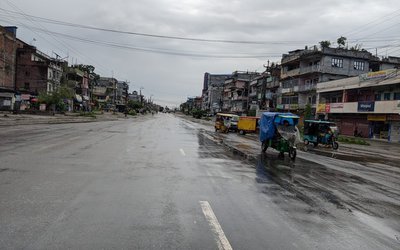
The world seems unpredictable with the COVID-19 pandemic and the loss it will bring to put up with. Nation states focused on their measures and regional intergovernmental organizations are looking for collective efforts while the World Health Organization (WHO) a UN apex body is vigorously working to provide answers and concerned over the impact. Weather inter agency, political level of governance, bilateral, multilateral or global; cooperation and coordination is the key to tackle and control the spread of Corona virus.
In the recent history, the world has been witnessing pandemics; the Spanish Flu during 1918-1920, one third of the world’s population or 500 million people were infected and an estimate of 50 million worldwide with about 675,000 occurring in the US died. The Swine Flu pandemic of 2009 originated from Mexico impacted 11-21% of the then global population with 150,000-575,000 fatalities. Known as the West Africa 2014-2016 Ebola epidemic originated in the forested rural region of Southeastern Guinea. The impact was less to the world and more to West Africa with a total of 28,616 cases and 11,31o deaths. There were 36 cases and 15 deaths that occurred outside West Africa. When outbreak, endemic or pandemic infection strikes, declining economic activities impact global security. Lessons have been learnt and best practices identified and Nepal could set an example.
As of March 31, the John Hopkins University has confirmed, the impact of Coronavirus, which is called ”Wuhan Virus” by Mike Pompeo for its origin in China’s Wuhan City and President Trump tweeted “Chinese Virus” caused deaths of over 37500 globally with more than 780,000 cases with 152,000 so far has reported recovery. 177 countries and territories have reported cases. China though has controlled this deadly disease; it is spreading in different continents. The pandemic could cost the world economy up to 2 trillion US dollar this year. The loss in tourism sector is estimated between 30 and 50 billion dollars. The probable recession in which annual rate of economic growth possibly will fall below 2.5% with the slowdown of the world economy to 0.7 to 0.9%. The stock exchange markets in a range of countries are deafening. In Nepal’s bordering states, in India sees rise in positive cases as tally reaches 660. Of the total 82,119 cases in China the total deaths is 3,308 that is 4.2% and has come up as a model to answering the challenge. Italy with the death of 11,591 of 101,739 is the highest death toll of 11.39%. There is a surge in the US with 3,002 deaths of 163,197 cases. There are currently at least 47 vaccine programs underway, according to a list kept by the Miken Institute.
India plays a momentous role and PM Modi’s initiative to get South Asian Association for Regional Cooperation (SAARC) nation’s togetherness to face the pandemic challenge is commendable. SAARC leaders’ visual interaction did provide information on measures and internal preparedness as well as an opportunity to collectively move forward with cooperation and coordination. Heads of State and Governments missed the opportunity to communicate respective country’s strategy and propose regional procedures to mitigate both direct and indirect affects at the strategic level. SAARC leaders are looking for a model to face corona pandemic which should be an extraordinary example. This could lead to formulating other models for collaborated and collective efforts on common challenges in different fields like regional security as the magnitude of the Asian order will occupy a fundamental part and South Asia is vital.
Nepal has 5 cases so far though the WHO has put Nepal in the high-risk category for its prospective to get affected. Nepal has decided to quarantine itself and also suspended visa-on-arrival and suspended imports of edible items from China. It established 41 out of 129 land crossing points with India and China. Tourist arrivals by air to Nepal dropped by 21% in February and almost a minimal now. The Chinese tourists arrival was expected to reach 350,000 in 2020 came to a drop. All the hotels look uninhabited. Asian Development Bank estimates that Nepal is likely to shave off up to 13% of its gross domestic product and loss of 15,880 jobs.
The need to move swiftly after the virus to stop the change of transmission with policies is the remedy. The need to deeply engage with individuals, families and the community and strategy adoption by nation states, geographic regions and inter-continental plays significant. The importance of coordinated efforts with connectivity of policies, measures and action requires of being coherent. It is also time to look into the national security and other sectoral impact like the economy, schools and social. The government must move and be fast, should have no regrets, and the tools and instruments must be the first mover, as virus will get you if you do not move quickly. In emergency response preparedness is one of the great things. If you choose to be right before you execute you will never win. In emergency management perfection is the enemy of the good and speed leads the way for perfection. The problem we have in the tools and instruments of the government is that the decision makers are afraid of making mistakes, everyone is afraid of the consequences of error but the greatest error is not to attempt, the greatest error is to be paralyzed by fear of failure.
At the initiation, the Nepalese Army successfully completed the quarantining of evacuated Nepalese from China but more is on the way to be prepared with preventive, preparation and post eventualities. National security will be at risk if Health, Finance, Diplomacy, Defense, Law Enforcement Forces and Intelligence Agency’s cooperation lack to prevail.
Nepal can never be immune to the COVID-19 developments. The challenge will be to keep our fatality rate as low as possible and take containment measures more harsh which will assist the already stressed public health system. Nepal has done well in containment. Now mitigation that is to enforce social distancing closing schools, shops, cinemas, banning public events, even shutting down mass transit systems. Second as the public health network is not good, the government needs to be prepared for infrastructure, financial arrangement with equipped forces if the pandemic hits.
The Ministry of Foreign Affairs could coordinate with the SAARC Secretariat that is in Kathmandu to establish groups and sub groups as operational components at capitals of member states for effectiveness of measures and supply of basic essentials to all South Asians.
A strategic central body with political and strategist could be established with an operational mechanism at the Provincial level which will direct the Local political bodies to be accountable to the people for containing and mitigating through prevention, preparedness and execution. This is a potential war so with political unity the country is united to face the global challenge.
The government should look into the economy that has impacted the stock market, tourism and travel, which is at the lowest due to containment. If the situation deteriorates and lockdown occurs there will be major disruption of economic activity including trade. The Government has to take advantage of the lessening of the oil prices. The worst scenario is a prolonged lockdown in India which will have global impact but Nepal with severity and most likely push the country’s economy, supply and resources into negativity and unconstructiveness. Slow down of remittances and the return of a large number of workers will add to the Diasporas.

Binoj Basnyat
Basnyat is a retired Nepali Army Major General, is a political and security analyst
- Russian Aggression In Ukraine And Outcome In South Asia
- May 05, 2022
- The Nepal Opportunity 2079
- Feb 04, 2022
- Change Of Guards Part -II
- Jan 07, 2022
- How India Lost Post 12-Point Agreement
- Dec 29, 2021
- US Troops Withdrawal From Afghanistan And Implication To South Asia
- Jul 31, 2021















